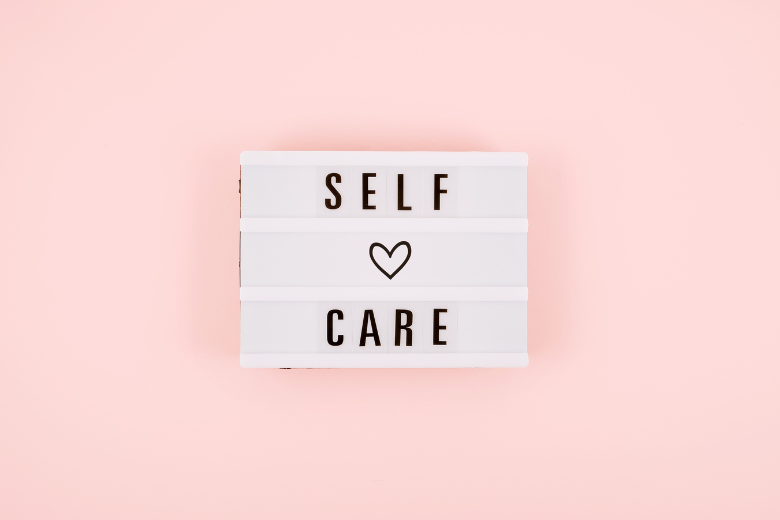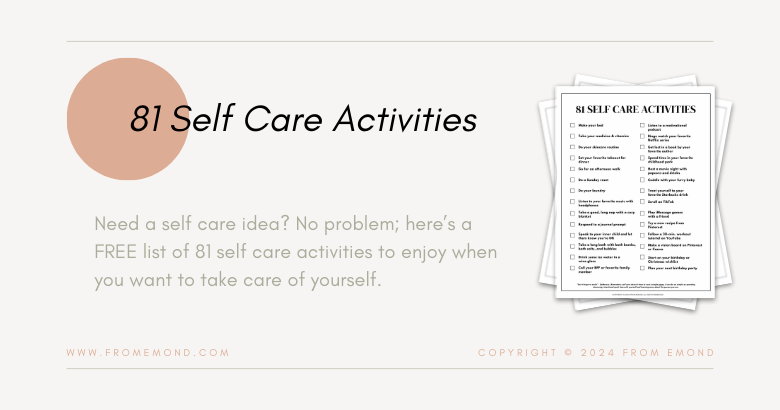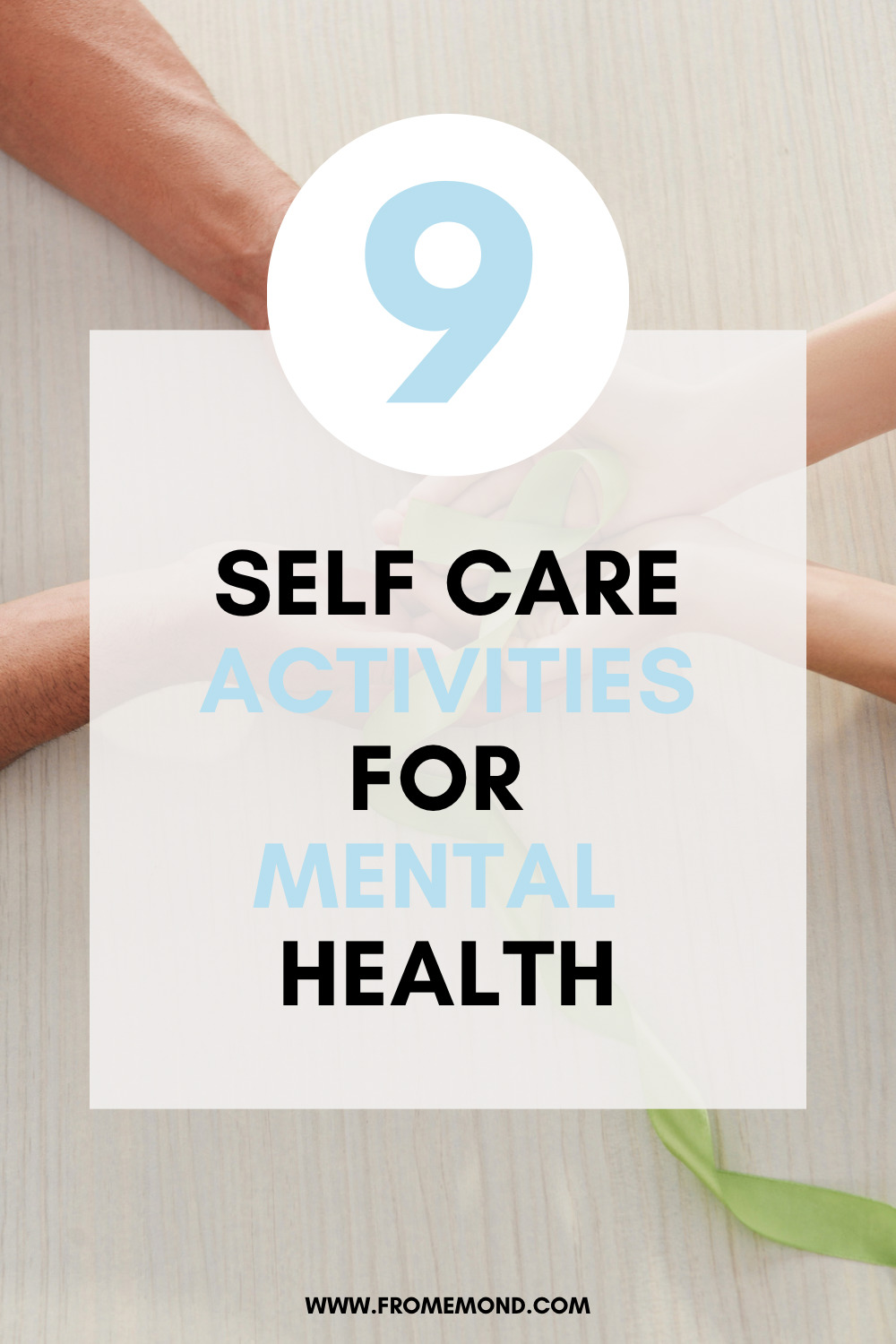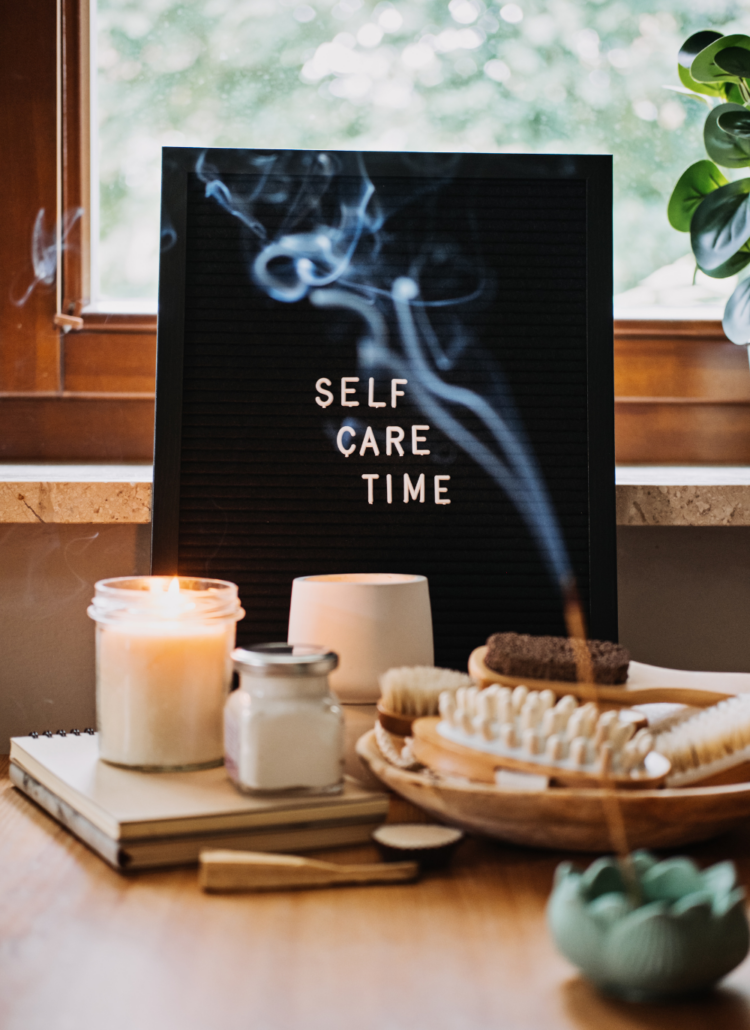Although I am a personal development blogger by profession, I am in no way a mental health professional. See my disclaimer for more info.
Improve your mental health with these 9 best self care activities for mental health. These activities are fun and enjoyable!

Have you been looking for ways to improve your mental health? Whether you recently suffered the loss of a loved one or endured another emotional toll, you might be searching for ways to lift your spirit.
To be quite frank, I was probably at my lowest during my junior year of high school. I didn’t have any friends and I would constantly talk down on myself. But after some time I finally took the initiative to research ways to improve my mental state and I now live much happier.
If you’re looking to do the same, you’re in the right place. Keep reading to learn all about my favorite ways to improve mental health.
This post is all about self care activities for mental health.
Why is self care important?
Take a step back and think about who you spend most of your time with. Is it friends, family members, or maybe yourself?
We need to balance our relationships with others and with ourselves.
The most important relationship you can have is with yourself. When you finally learn about the kind of person you are, you’ll truly be satisfied in life.
But, how do you get there? By practicing self care!
Self care for mental health is important to:
- manage stress
- explore your creativity
- form a stronger and more positive relationship with yourself, and so much more.
I challenge you try out some of the self care activities for mental health in this post.
They will help you discover who you are, and learn that you are important.
Self Care Activities for Mental Health:
1. Connect with your inner-creative
When you’re feeling down, one of the best things you can do is to enjoy some of your hobbies. These can include:
- Painting
- Playing an instrument
- Writing
- Cooking
- Baking
- Gardening
- Fishing
- Photography
- Creating music
- Crocheting
- Yoga
- Hiking
- Podcasting
- Jewelry making
- Candle making
- Scrapbooking
- Sewing
- Reading
- Volunteering
As you can see, there are so many things to you can do for fun to feel better.
Connecting with your inner-creative self allows you to explore the different creative parts of yourself and have a good time doing what you love.
If you ask yourself, “Do I even have any hobbies?”, don’t worry.
You can always discover something new. Before you know it, you’ll feel like you can’t live without doing that one thing.
Or, if you’ve tried something before and weren’t consistent, you can try again.
For example, if you’re not the biggest reader, don’t give up.
You can take it day by day.
Maybe start by listening to audiobooks!
I love audiobooks — especially when I have to read a book for a class. I can listen to them and get the information I need without having to actively read hours of content.
If you’re in the same position, listening to audiobooks could truly jumpstart your reading “obsession.”
You could then transition into listening to the audiobook while simultaneously reading the physical book.
If you’re comfortable with this, great! The overall goal is to enjoy reading, like any other hobby.
As long as you’re alive, you have infinite chances to start again!
It’s important that you remain resilient and determined so you can work to become consistent with your hobby.
2. Say self affirmations out loud

When we’re going through something, we have tons of negative thoughts going through our minds.
These thoughts then go on to affect the way we view and navigate life.
Remember, your mental health is like the foundation for every other aspect of your life.
So, what do you do when you’re having repeated negative thoughts?
Shut them out.
You need to tell yourself that these negative thoughts don’t hold any weight because… well, they don’t!
You can do this by saying positive, uplifting self affirmations.
A self affirmation is basically a positive phrase you say to yourself, usually out loud, to improve the state of your mental wellbeing and self-worth.
Start today by using some of these positive self affirmations:
- “I am strong. I am worthy. I am talented.”
- “I can do anything I put my mind to.”
- “I am beautiful, blessed, and happy.”
- “I woke up today as a sign to keep working hard to reach my goals.”
- “I deserve to be where I am.”
- “I can get through battle that I face.”
3. Care for your body
You may not like exercising, but what if I told you it could lead to a healthy mind?
Earlier I said your mental health could improve your physical health. That’s true both ways.
Exactly how does working out improve your mental health?
When you exercise, your body releases endorphins, which are responsible for making you feel happy and joyful.
I’m reminding you that you don’t have to do some crazy hour-long exercise that’ll leave your head pounding and breathless.
No, that’s not the goal here.
You want to do a simple workout (about 15-30 minutes) to get your body moving and ultimately feel good overall.
Here are some simple exercises/workouts:
- Yoga
- Running
- Hiking
- Jogging
- 15-minute video exercises on YouTube
- Pilates
- Dancing (yes, I consider dancing a workout. You’ll be shocked how active you could get by dancing to a few songs on your favorite playlist).
4. Incorporate 5 mindful minutes into your daily routine

One of the best things you can do for self care is to practice mindfulness.
Over the years, people have learned about and practice mindfulness more and more.
What is mindfulness?
Mindfulness refers to spending time to acknowledge how you’re feeling mentally, and doing calm things to improve the state of your mind.
You can easily incorporate 5 mindful minutes into each day — whether it’s before you get out of bed in the morning, during your lunch break, or just before you climb back into bed at nighttime.
Here some mindful activities:
- Meditation
- Yoga
- Prayer
- Sound bath
- Eating mindfully
- Assembling puzzles
- Reading
These are just a few of the many activities you can do to practice mindfulness.
You can also download apps like Calm, Headspace, and BetterSleep to follow mindful exercises and track your progress.
Mindful Eating
Mindful eating is paying close attention to the different flavors and smells of the food you’re eating, and not consuming any media while you do so.
I’m almost positive that you, a fellow Gen-Z member, watch a YouTube video or scroll through social media while you eat.
While this is totally fine, consider taking time away from the screen every now and then.
You may also *feel* full faster by eating mindfully.
That’s not exactly the case.
In reality, you’re being intentional about your meal and you don’t have any distractions to get in the way of your brain telling you that you’ve had enough food.
So, you may realize that mindful eating can be quite beneficial.
Try some of the mindful activities every now and then when you feel you need some self care for mental health.
5. Be one with nature
With growing social media platforms like Instagram, X (Twitter), and TikTok, you might be stuck in the house way too often.
A common phrase I hear someone tell a person who rarely spends time outside is:
“Go touch some grass.”
Some people may take think that’s offensive.
If you’re one of those people, perhaps you really should consider going outside and spending time in nature.
You may not feel like it, but I challenge you to get up and walk around your environment for about 15 minutes.
You’ll return home feeling so refreshed!
You got some fresh air, got away from your devices, and maybe even talked to a few people along the way.
Free Self Care Activities
Would you like a free self care activities list?
I know it can be difficult to think of different self care ideas, so I did the work for you!
I created a FREE list of 81 self care activities that you can enjoy.
To get the list, simply click here.

6. Fix your sleep schedule
Another thing we Gen-Z members have in common is not getting enough sleep.
I’m sure you know that sleep is important to get through the day But did you know that getting enough sleep can improve your mental health?
Columbia University‘s Department of Psychiatry does a great job of explaining the importance of sleep, and how it influences your mental wellbeing.
They say that it can improve your:
- cognitive skills
- creative thinking
- attention
- learning
- memory
I also learned this in my AP psychology class in high school.
You’d think I would’ve applied those lessons immediately. But like many other teens, I still went to bed at 11 PM.
(I still have some work to fix in that area, haha.)
How are you expect to get through the day if you only get 6 hours of sleep?
You need at least 8 hours of sleep as a teenager.
Remember, during this time, your mind, brain, and body are still developing. So it’s important that you get enough sleep to help with these ongoing changes within your body.
How do you fix your sleep schedule?

First, spend a few nights analyzing your sleep patterns.
Use a sleep tracker to write down what time you fall asleep, how many times you wake up in the middle of the night, when you wake up, and how you feel when you wake up.
These are the most important things to think about when you analyze your sleep to prepare to build a better sleep schedule.
Next, every night you should work to go to sleep earlier and earlier.
Start slow! You won’t be very successful if you randomly go from going to sleep at 11 PM to hitting the sheets at 8 PM.
Your body simply won’t be able to adjust to this instant change.
Plus, you’ll just be laying in bed, frustrated, until you finally rest your eyes.
I suggest going to sleep about 20-30 minutes earlier one week and analyzing your progress as you do so.
Then, over time, you’ll naturally be able to go to sleep at your desired time and get the most amount of sleep possible.
Keep in mind that it can take weeks to months to build a habit, depending on how consistent you are with it and how important it is to you.
Don’t be discouraged if you slip and go to bed at midnight one night. Just keep working toward your goal!
7. Express your gratitude
To express your gratitude basically means to show people that you are thankful for them, or take time to appreciate your blessings.
Expressing your gratitude is insanely helpful for mental health because it can help you to recognize everything that you have in life.
Sometimes, you might think a problem that you have is bigger than the world.
But once you count your blessings, you realize that maybe that problem isn’t as big as you thought.
Showing your gratitude is easy.
Start with a blank sheet of paper and a pencil.
Sit down and think for a minute. Think about all the things and people you are thankful to have in your life.
You’ll most likely have some ideas instantly pop up in your brain, like food, water, and shelter.
These are definitely great starters — especially because not everyone has access to these things that you need to live.
Once you write some of the more common things, think of some deeper (and more specific) about things in your personal life that you are grateful for: your
- financial situation
- intelligence
- job
- creative skills
- great handwriting
- family
8. Spend time with your friends and family

Yes, you need to make sure that you spend time with yourself.
But, you can’t go through life alone!
You have to spend time with people who lift you up and who only want to see you succeed.
Spending time with your friends and family lets you get out and laugh, but also have serious conversations.
Sometimes, talking about your problems can make you feel less worried about them.
Also, it can help you realize that you’re not the only one going through something.
So, whenever you’re feeling down, consider going on a walk with your brother or sister and talk about how you’re feeling.
You can also try one of these free self care activities.
They don’t cost you anything and they really help to make your soul feel good.
9. Reflect on your thoughts and emotions
You can write in a journal to improve your mental health.
There are a lot of pros to writing in a journal. But the main one is that it allows you to express how you’re feeling and thinking.
You can either start with a blank sheet of paper or search for some journal prompts online.
If you are just getting started with journaling, I definitely suggest that you look for a journal prompt to write to.
This will help to give you some ideas on what to write about instead of thoughtlessly staring at a blank piece of paper.
Free Daily Journal
This journal is my favorite because it includes a section to mark how you’re feeling before you start writing, plus just enough lines to let all your feelings out.
Journaling is absolutely one of my favorite ways to practice emotional/mental self care, and my free daily journal can help you do just that.
Click here to get the FREE journal now!

Self Care Activities for Mental Health
Let’s recap.
In this post, we talked about 9 of the absolute BEST self care activities you can do to take care of your mental health:
- Connect with your inner-creative
- Say self affirmation aloud
- Care for your body
- Incorporate 5 mindful minutes into your daily routine
- Be one with nature
- Fix your sleep schedule
- Express your gratitude
- Spend time with your friends and family
- Reflect on your thoughts and emotions
Remember, your mental health is in control of every part of your life.
If you’re not doing well mentally, you might notice that others parts of your life will oftentimes suffer. So, take the steps to reach mental healthiness today!
For free self care ideas, check out this post.
Don’t forget to smile,
DeMarcus
PIN IT FOR LATER:

This post was all about self care activities for mental health.




Leave a Reply